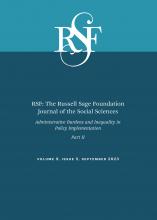Abstract
Administrative burdens are the frictions that people face in their encounters with public services, leading to meaningful costs that include learning, compliance, and psychological costs. We offer evidence that burdens are a key source and consequence of inequality, resulting in disparate outcomes in people’s access to basic rights. We also detail how these outcomes are patterned by targeting, federalism, bureaucratic pathologies, and the growing use of the private sector and tax system to deliver social welfare benefits. Throughout, we highlight recent and novel contributions, including empirical research in this double issue, that have helped clarify how and why administrative burdens shape inequality. Burdens have not received the political, policy, or research priority that is commensurate with their magnitude or impact on individuals. We conclude by arguing that we need a coherent language and framework to recognize and, where appropriate, reduce burdens across a wide array of policy domains.
- © 2023 Russell Sage Foundation. Herd, Pamela, Hilary Hoynes, Jamila Michener, and Donald Moynihan. 2023. “Introduction: Administrative Burden as a Mechanism of Inequality in Policy Implementation.” RSF: The Russell Sage Foundation Journal of the Social Sciences 9(5): 1–30. DOI: 10.7758/RSF.2023.9.5.01. Direct correspondence to: Pamela Herd, at ph627{at}georgetown.edu, Georgetown University, McCourt School of Public Policy, 37th Street NW O Street NW, Old North #100, Washington, D.C. 20057, United States.
Open Access Policy: RSF: The Russell Sage Foundation Journal of the Social Sciences is an open access journal. This article is published under a Creative Commons Attribution-NonCommercial-NoDerivs 3.0 Unported License.






